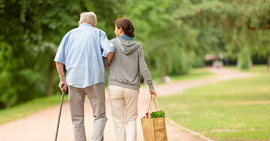When the COVID-19 lockdowns called for "social distancing" to help combat the pandemic, most of us began to maintain a physical distance but not social distance.
We had extra time at home with our families or roommates; we used our phones and other devices to keep in touch with family and friends outside of our homes, and we took small risks to get together in backyards or parks with colleagues or friends while distancing. However, seniors have been social distancing, and in many cases, this has led to complete social isolation for this age group.
As we have been going in and out of lockdowns, the majority of seniors were still staying indoors throughout the past few months. They were forgoing their grandkids' birthday parties, skipping church services, and missing classes at community centers.
They are trading breakfast with friends for grocery deliveries and swapping book clubs for reading alone at home. They are cancelling doctors' appointments with the hope that nothing serious is wrong with their health and having family members stop by long enough to say hello through a window and leave prescriptions on the doorstep.
Social isolation for seniors is not new, but it has become pronounced due to COVID-19. Before the pandemic, nearly 25 percent of adults aged 65 and older were considered to be experiencing social isolation and over 40 percent reported experiencing loneliness.
Seniors are more likely to experience loss of close friends and spouses, chronic illness, vision and hearing loss, and limited mobility, factors that all contribute to isolation. The pandemic has exacerbated these circumstances for many seniors.
As COVID-19 spreads and cities shut down, seniors have become isolated from their close families. They have also been cut off from some of their primary forms of social support, including extended relatives and friends, faith communities, community centers, and social groups.
For seniors that live alone, this has brought about a time with little to no human interaction. While seniors living in retirement homes and senior care facilities might have limited interaction with staff and their peers within the facility, many facilities have instituted strict visitation and contact policies.
These policies have completely prohibited seniors from seeing family and friends outside of the facility. Since seniors also tend to have lower incomes, the possibility of affording physically distant events or changing living arrangements is limited.
The Impacts on Health and Wellbeing
While social isolation might seem like a temporary condition, social isolation extends beyond social impacts for seniors. Seniors who face social isolation are more likely to experience a premature death, dementia, heart disease, stroke, cognitive delay, depression, anxiety, and suicide. They are also more likely to abuse drugs and alcohol and neglect participating in physical activity. The impacts of social isolation for seniors are severe and dire.
What makes social isolation during the COVID-19 pandemic more unique is that due to the health decline of ageing and underlying medical conditions, seniors are at high risk of developing a serious illness and dying if they contract the virus. Seniors living in retirement homes and senior care facilities are also more likely to contract COVID-19 due to living close to one other.
Seniors' health is paramount, yet to keep safe from COVID-19, many seniors avoid hospitals and medical care centers where they feel COVID-19 might be present. Many seniors have become disconnected from health care as they postpone or cancel doctor visits – further jeopardizing their health and wellbeing.
While many seniors face isolation, which may contribute to detrimental health outcomes, they can significantly benefit from family and friends' support. Seniors are resilient, and with the proper support, they can overcome isolation, even during a pandemic.
If you have a senior in your life that is at risk for social isolation, there are things you can do to help:
Help monitor their health
Help the senior in your life monitor their health: Often, isolation creeps up on seniors, and they may not realize that for months or years, they have become socially isolated. With all of the changes happening during COVID-19, seniors and their families may have also missed vital social isolation signs. Monitoring their health and wellbeing of the seniors in your life can help you stay connected to your loved one and ensure they are looked after.
Skiin Connected Clothing aids in monitoring your loved one's health and wellbeing, no matter how far you are from them. With Skiin clothing, you can view their health and wellbeing using the Skiin Connected Life App to review the information collected and tailored feedback. To connect with your loved one on a deeper level and to help ensure that they get connected to care when necessary, consider purchasing a Skiin garment for them.
Teach the Senior in Your Life How to Use technology
Teaching your loved one to use technology not only connects them to you, but technology will connect them to the outside world they previously knew and loved.
Video chatting with family and friends is a simple and instant way to keep seniors connected. Many faith services, book clubs, affinity groups, and social activities have been moved online due to COVID-19.
Teaching seniors to access these services can help them stay connected from the safety of home. You can also use the Skiin Aura feature to stay connected to your loved one via video chat. It includes the added benefit of viewing their health and wellbeing info as an overlay during your call.
Occupy Their Time
Think outside of the box: When close contact is discouraged, it is essential to think outside of the box about social gatherings and ways to reduce the feelings of loneliness.
Seniors can keep up with doctor appointments, including mental health services, via phone or video chat. Getting an easy to care for pet might provide companionship as well as something to occupy their time. Seniors may also benefit from planning their days ahead of time, participating in distant gatherings or walks, and participating in hobbies that they can do alone or with just one other person, including painting, puzzles, or gardening.
Seniors are strong, steadfast, and resourceful. With our support, they can combat both the COVID-19 pandemic and social isolation.




